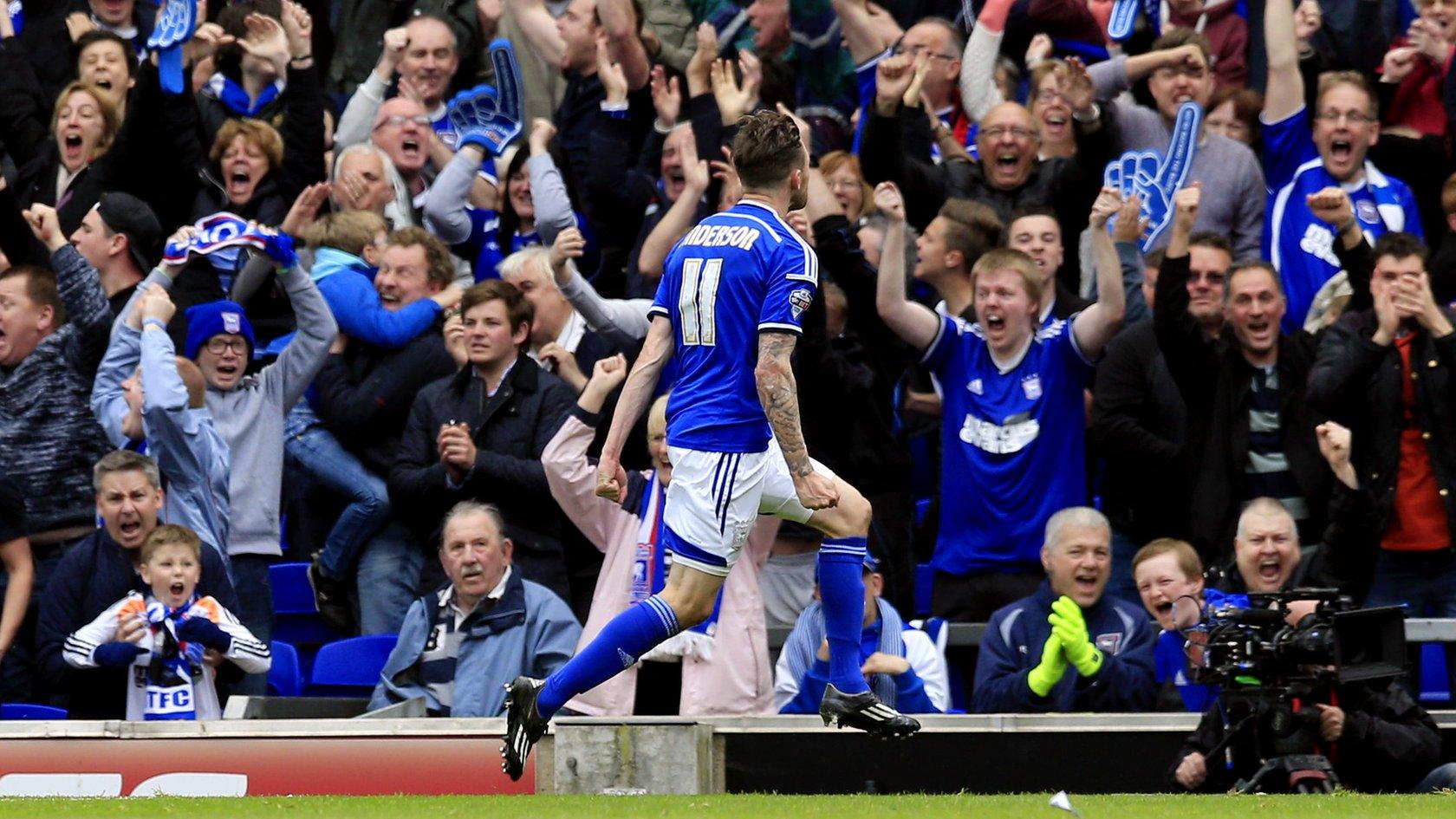Norwich v Ipswich: Play-off clash reignites old rivalry
- Published
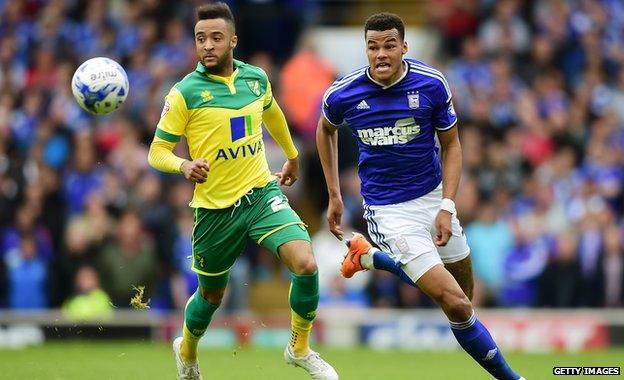
All is to play for after Ipswich and Norwich drew the first leg of their play-off semi-final
With a 45-mile divide, the Ipswich-Norwich football derby stretches the use of the definition "local". So why is it that anyone who has ever been involved in the ties, either as a player or a fan, will testify they are as fiery as any of the supposedly bigger derbies in the country?
In terms of bragging rights, the two sides have met competitively on 96 occasions since the end of World War Two and Ipswich are slightly ahead - with 40 wins to 38. But, it is Norwich who had the momentum coming into this year's play-offs, having won four consecutive ties.
Last Saturday's 1-1 draw at Portman Road has made the return leg at Carrow Road the most important derby since the 1985 League Cup semi-final, which was won by eventual champions Norwich.
At stake this time round is a trip to Wembley for the play-off final, with the winner rewarded by promotion to the Premier League and an estimated boost of about £120m to their coffers.
Not that money is important when local pride is at stake.
"It's fair to say it's up there with the very most important of them all," author Rob Hadgraft said of Saturday's tie.
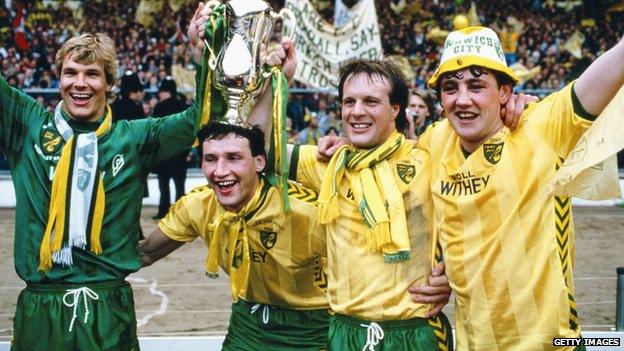
Norwich City won the 1985 League Cup after beating Ipswich in the semi-final
Hadgraft charted the history of the derby for his book, The Old Farm, the title of which is a play on words on the notoriously volatile Glasgow derby between Rangers and Celtic, known as the Old Firm.
"I think it's always been very, very intense, going right back to after the Second World War," Hadgraft said. "Once they were in the same division in the Football League it really did grow - more so than some of the other derbies around, where bigger places are involved."
A 2008 study, external suggested the East Anglia derby was second only to West Bromwich Albion v Wolves as the fiercest rivalry in English football.
Emotions often boil over on and off the field, and police now do everything in their power to keep the two groups of fans apart.
"I think it's because each club represents the entire county," Hadgraft said. "There's only one club in Norfolk, and the same goes for Suffolk.
"The people live up to 40 miles apart, so they don't mingle and have pals who support the other lot.
"In cities like Liverpool, everyone knows an Everton supporter and vice versa. The fans would have drinks together and there would be light-hearted banter.
"But with Norwich and Ipswich you've got two sets of fans who never really mingle or mix, and there's no proper friendships.
"They really do despise each other."
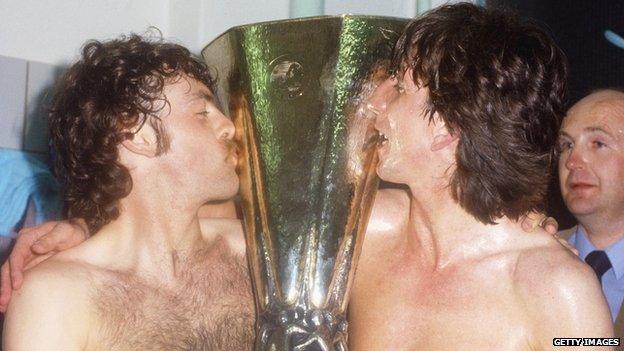
John Wark, left, won the UEFA Cup and FA Cup with Ipswich
The rivalry is deeply entrenched in the counties' cultures, Hadgraft says, drawing a comparison to battles staged 2,000 years ago.
"Way back the Iceni tribe were based on one side of the border, and there were various invasions going on - obviously long before football was invented," he said.
"The two tribes, one came from the south and one from the north, did battle in that area that is now the border."
Does that make John Wark Ipswich's Boudicca (who led an Iceni uprising against the Romans)?
The Scotland international is certainly considered an Ipswich legend, and a nemesis for Norwich - having scored nine goals in 19 derbies for the Blues.
Wark, who also played for Liverpool against Everton, admits to being surprised by the level of passion come derby day in the East.
"I still think the biggest derby is Celtic-Rangers, that's another level," he said. "But, I didn't realise that Ipswich and Norwich would be up there - even though they're an hour away from each other.
"Suffolk is quite a quiet, reserved place, Norfolk as well. But once the game gets going..."
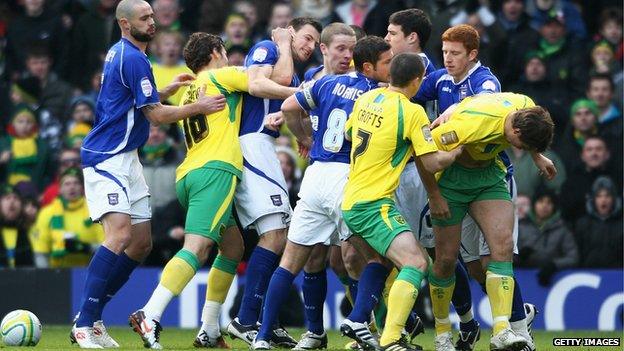
Emotions often run high in the East Anglian derby
Wark talks fondly of the good friends he made from the rivalries - including ex-Norwich players Bryan Gunn and Robert Fleck - but says he would be wary of heading to any pubs in Norwich near matchday.
Wayne Colby, a 50-year-old Ipswich fan who lives in Norwich, can empathise.
"When I walk in my local pub, they all say 'Here comes the scummer, here comes the scummer' and they put their arms around me," he said.
"They say I'm 'The friendliest Ipswich fan we know, the only one we'll take to our heart'."
Mr Colby's light-hearted exchanges back up Hadgraft's belief tensions between the two sets of fans could be lessened if interaction was more frequent.
But he is an exceptional case, since his 48-year-old brother Dale, who lives down the road, is an ardent Norwich fan.
"When we were younger, about 10 or 11, we used to play football out in the street, pretend we were the Ipswich and Norwich players," Mr Colby said. "There was one time when we started arguing and thumping each other.
"Our mother brought us indoors, gave us a slap, and then we started to fight upstairs."
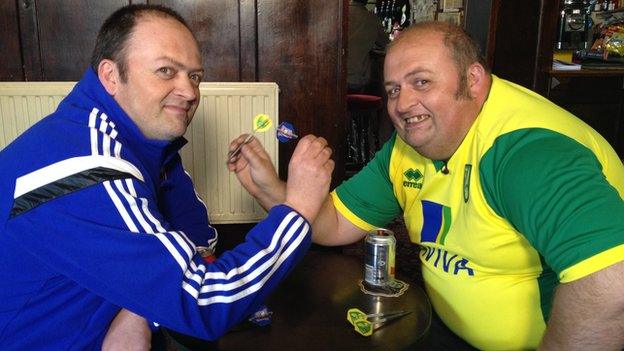
Brothers Wayne and Dale Colby say they enjoy a "friendly" rivalry
He says this is the only time they ever came to blows, and they now enjoy a "friendly" rivalry.
"He'll always be my brother, but when it comes up to derby days the brotherly love goes out the window," he said.
Dale is confident Norwich will make it to the final so is watching Saturday's match on TV, thus allowing him to save some money for a trip to Wembley.
However, he has decided to view the game away from his brother and father, who he says is also an Ipswich fan and takes it "more seriously" than the siblings.
The brothers say they tend to talk to each other less in the week before a big match, but will meet up on Sunday for dinner - with the losing supporter possibly picking up the tab.
"We'll talk about the match and probably flick Yorkshire puddings at each other," Dale said.
- Published10 May 2015
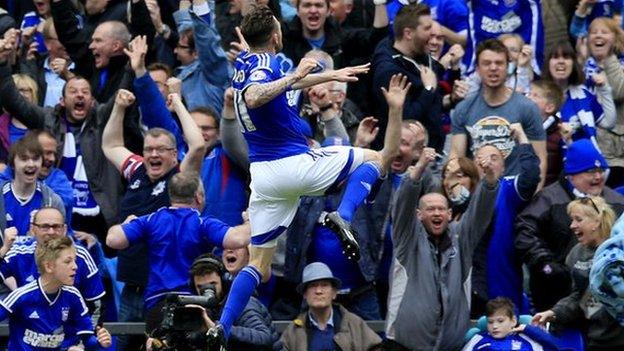
- Attribution
- Published5 May 2015
